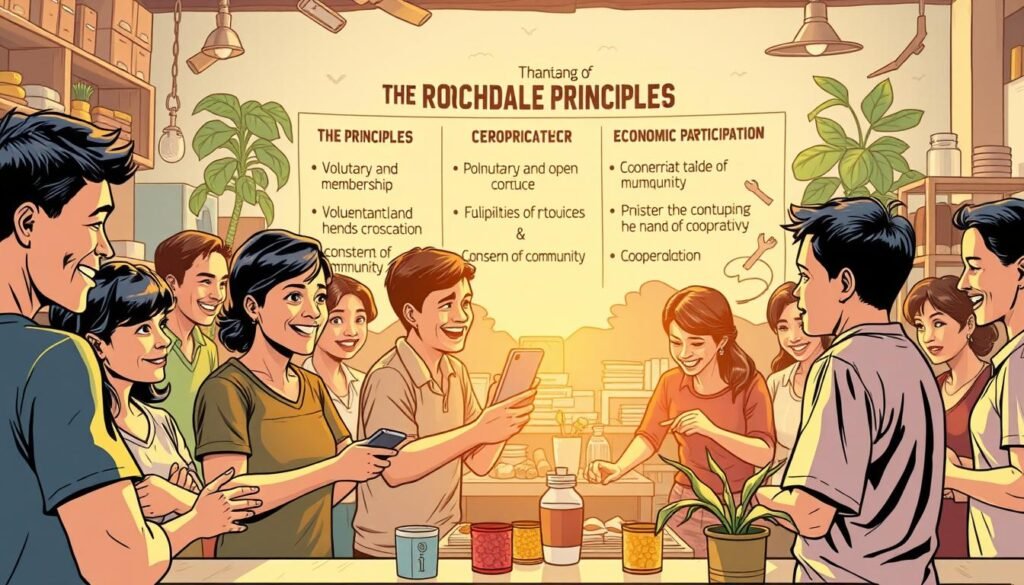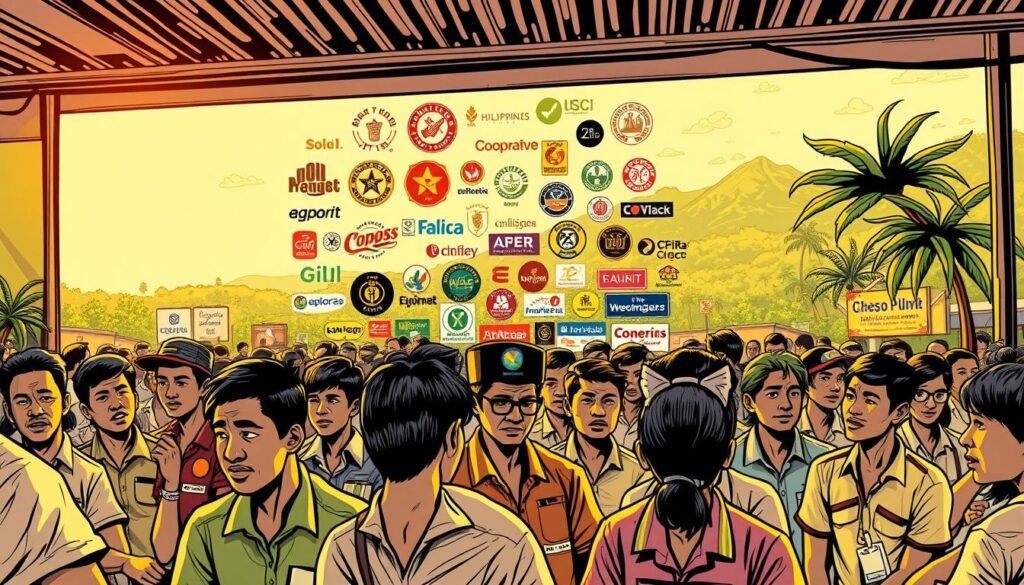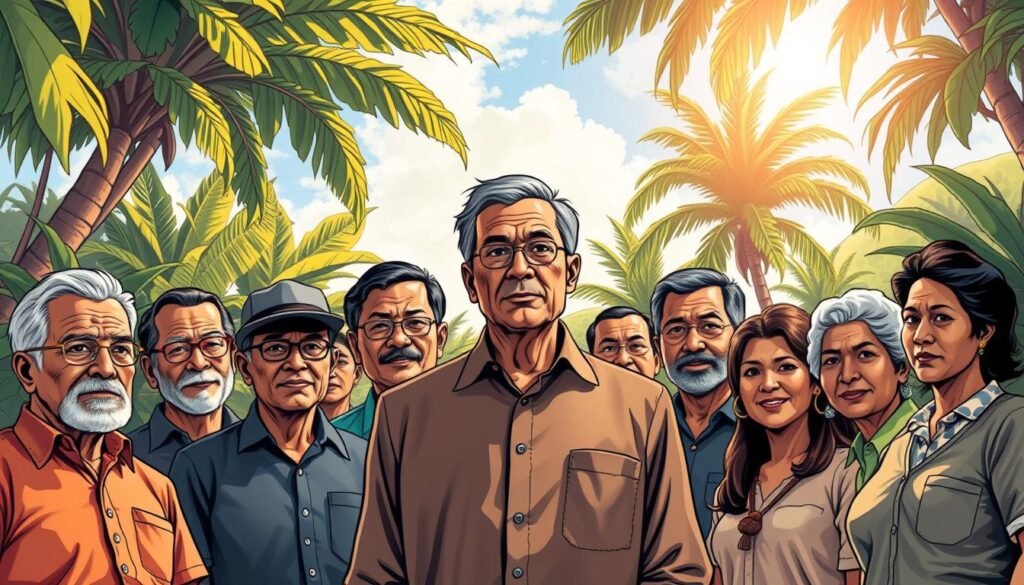José Rizal, a national hero of the Philippines, is often celebrated for his literary works and role in the fight for independence. However, his contributions to the development of community-based enterprises are less widely known. Rizal’s vision extended beyond politics, focusing on empowering Filipinos through collective action and shared ownership.
Rizal believed in the power of unity and democratic principles. His ideas laid the groundwork for the first cooperatives in the Philippines, where each member had an equal voice. This model mirrored global cooperative practices, emphasizing fairness and community needs.
His influence on the cooperative movement was profound. Rizal’s approach to reform, rooted in nonviolent methods, inspired a shift toward economic self-reliance. His legacy continues to shape the cultural and economic landscape of the Philippines today.
Key Takeaways
- Rizal played a key role in the early development of Filipino cooperatives.
- His vision emphasized democratic principles and shared ownership.
- Cooperatives provided a model for community-based economic empowerment.
- Rizal’s nonviolent approach inspired lasting social and economic change.
- His legacy remains relevant in modern cooperative practices.
Introduction to Rizal and the Cooperative Movement
While Rizal is widely known for his role in Philippine independence, his economic ideas remain underappreciated. Beyond his fight for freedom, Rizal championed community-based enterprises as a way to empower Filipinos. His vision was rooted in unity, shared responsibility, and democratic principles.

Overview of Rizal’s Contribution
Rizal was not just a nationalist but also an innovator in social organization. He believed that economic self-reliance was key to national progress. His ideas laid the foundation for the first co-ops in the Philippines, where every person had an equal voice. This model emphasized fairness and meeting community needs.
The Emergence of Cooperative Ideas in the Philippines
The concept of a co-op emerged as a response to colonial exploitation. Rizal’s writings inspired Filipinos to work together for economic independence. These early initiatives focused on shared ownership and collective decision-making, principles that remain relevant in modern business practices.
Today, cooperatives continue to play a vital role in the Philippine economy. They provide a platform for community empowerment and economic growth. Rizal’s legacy reminds us that unity and shared responsibility are essential for lasting progress.
Historical Roots of Cooperatives in the Philippines
The roots of collective economic efforts in the Philippines trace back to early community-driven initiatives. These efforts were built on the principles of mutual aid and shared responsibility, laying the groundwork for modern economic collaboration.
Early Cooperative Models and Their Influence
Early models like friendly societies and worker associations played a pivotal role in shaping the cooperative movement. These groups emphasized community service and mutual assistance, creating a foundation for shared economic ventures.
European experiments, particularly the Rochdale Principles, also influenced Filipino enterprise models. These principles introduced ideas of democratic control and equitable profit distribution, which were adapted to local contexts.
“The success of early associations was rooted in their ability to address immediate community needs while fostering long-term economic resilience.”
During the colonial and post-colonial periods, associations became a cornerstone of Filipino economic thinking. They provided a platform for collective decision-making and resource sharing, addressing challenges like exploitation and inequality.
Examples of early ventures include the College Consumers Cooperative, established in 1916. This initiative focused on providing essential services to its members, from groceries to educational supplies. Despite facing challenges like natural disasters and legal disputes, it remained a symbol of resilience and unity.
| Year | Event | Impact |
|---|---|---|
| 1916 | Establishment of College Consumers Cooperative | Provided essential services to members |
| 1927 | Typhoon destroyed cooperative store | Highlighted resilience and rebuilding efforts |
| 1945 | Total destruction during liberation struggle | Demonstrated the cooperative’s enduring spirit |
These early ventures faced numerous challenges, from natural disasters to legal disputes. However, their successes demonstrated the power of unity and shared responsibility, principles that continue to inspire modern economic collaboration.
Understanding Cooperatives: Principles and Values
The principles guiding collective economic efforts have shaped the way communities work together for mutual benefit. These principles, rooted in fairness and shared responsibility, ensure that every member has a voice in decision-making. One of the most influential models is the Rochdale Principles, which continue to guide cooperative practices globally.

The Rochdale Principles in Practice
Established in 1844, the Rochdale Principles set the foundation for modern cooperative enterprises. These principles emphasize voluntary membership, democratic control, and equitable distribution of profit. Members actively participate in the organization, ensuring that decisions reflect collective needs.
Surplus funds are reinvested into the community or distributed among members based on their contributions. This approach balances financial returns with community service, creating a sustainable model for economic growth.
Democratic Member Control and Economic Participation
Democratic control is a cornerstone of cooperative enterprises. Each member has one vote, ensuring equal influence regardless of their financial contribution. This structure fosters transparency and accountability within the organization.
Economic participation is equally important. Members contribute to the capital of the enterprise and share in its benefits. This model encourages active involvement and long-term commitment, strengthening the cooperative’s impact.
| Principle | Description |
|---|---|
| Voluntary Membership | Open to all without discrimination. |
| Democratic Control | One member, one vote. |
| Member Economic Participation | Equitable contributions and shared benefits. |
| Autonomy and Independence | Self-governing and self-reliant. |
| Education and Training | Empowering members and leaders. |
| Cooperation Among Cooperatives | Building networks for mutual support. |
| Concern for Community | Sustainable development and local focus. |
These principles ensure that cooperative enterprises remain focused on their mission of serving members and communities. By adhering to these guidelines, they safeguard against exploitation and promote long-term benefit.
For more insights into the historical context of collective efforts, explore the legacy of William Cameron Forbes in the Philippines.
Rizal’s Vision and Its Impact on Filipino Business
Rizal’s vision extended beyond politics, focusing on economic empowerment and community growth. His progressive ideas emphasized self-reliance, education, and the importance of collective action. These principles laid the groundwork for a business model rooted in equality and shared prosperity.

Rizal’s Ideals and Economic Philosophy
Rizal believed in empowering individuals through robust membership and active community participation. He saw economic equality as a pathway to national progress. His writings inspired Filipinos to work together, fostering a sense of shared responsibility and mutual support.
His ideals influenced how businesses could serve collective and social needs. Rizal’s emphasis on democratic principles ensured that every member had a voice in decision-making. This approach not only strengthened communities but also promoted sustainable economic development.
“True progress lies in the empowerment of individuals and the collective upliftment of society.”
Rizal’s vision also spurred wider development efforts. His ideas encouraged the creation of policies that prioritized community welfare over individual gain. This shift in economic thinking mirrored reforms seen in other nations, highlighting the universal relevance of his philosophy.
Educational initiatives played a crucial role in Rizal’s overall strategy. He believed that knowledge was the key to cultural and economic upliftment. By investing in education, Rizal aimed to create a society capable of driving its own development and achieving long-term prosperity.
Today, Rizal’s legacy continues to inspire Filipino business practices. His emphasis on equality, collaboration, and education remains a guiding force in shaping a more inclusive and resilient economy.
The Evolution of Cooperative Enterprises
The journey of collective economic efforts has evolved significantly over centuries, shaping modern enterprise models. From rudimentary structures to sophisticated institutions, these initiatives have adapted to meet changing economic and social needs. This evolution reflects the resilience and innovation of worker-led organizations.

From Early Beginnings to Institutional Change
Early collective efforts were rooted in mutual aid and shared responsibility. These models, often informal, laid the groundwork for more structured enterprises. Over time, they evolved into formal institutions, driven by the need for economic self-reliance and community empowerment.
The Mondragon Corporation, established in 1956, is a prime example of this transformation. Founded in Spain, it demonstrated how worker ownership could create sustainable and inclusive business models. Its success inspired similar initiatives globally, including in the Philippines.
Milestone Events in Cooperative Development
Key milestones have marked the growth of collective enterprises. These events highlight their adaptability and impact on economic and social reforms. For instance, the establishment of the Rochdale Principles in 1844 set a global standard for democratic control and equitable profit distribution.
In the Philippines, the College Consumers Cooperative, founded in 1916, became a symbol of resilience. Despite challenges like natural disasters and legal disputes, it provided essential services to its members, showcasing the power of unity.
| Year | Event | Impact |
|---|---|---|
| 1844 | Establishment of Rochdale Principles | Set global standards for democratic control |
| 1916 | College Consumers Cooperative founded | Provided essential services to members |
| 1956 | Mondragon Corporation established | Demonstrated sustainable worker ownership |
These milestones underscore the adaptability of collective enterprises. They have evolved to address industrial and technological changes, ensuring their relevance in modern economies. Worker-led initiatives continue to transform traditional job roles and work environments, fostering inclusive growth.
Cooperatives in Modern Philippine Society
In today’s Philippines, collective enterprises play a vital role in shaping local economies and fostering social progress. These organizations, rooted in shared ownership and democratic principles, empower communities to achieve sustainable growth. By focusing on collective needs, they address both economic and social challenges, creating a more inclusive society.

Economic Benefits for Communities
Modern collective enterprises contribute significantly to local economies. They provide essential services such as savings, credit, and insurance, ensuring financial stability for members. These initiatives also create jobs and support small businesses, driving economic development in underserved areas.
One key principle of these organizations is equitable profit distribution. Surplus funds are reinvested into community projects or shared among members. This approach ensures that the benefits of economic growth are felt by all, promoting long-term prosperity.
Social Impact and Community Development
Beyond economic gains, collective enterprises foster social advancement. They invest in education, healthcare, and other social services, improving the quality of life for their members. These initiatives align with Rizal’s vision of empowering individuals through unity and shared responsibility.
For example, many organizations focus on digital transformation, equipping members with skills for the modern economy. This investment in education and technology ensures that communities remain competitive in a rapidly changing world.
“True progress lies in the empowerment of individuals and the collective upliftment of society.”
By adhering to core principles like democratic control and community focus, these enterprises continue to transform neighborhoods. Their impact is evident in improved social services, stronger community bonds, and a more resilient economy.
Key Figures and Influences in the Cooperative Movement
The cooperative movement has been shaped by visionary leaders who championed equality and shared prosperity. These figures, from historical pioneers to modern innovators, have left a lasting impact on the principles and practices of collective enterprises. Their contributions have ensured that equity and value remain at the core of cooperative organizations.

Rizal and His Contemporary Pioneers
José Rizal’s role in the cooperative movement is often overshadowed by his political contributions. However, his vision of economic empowerment and democratic principles laid the groundwork for modern cooperative enterprises. Alongside Rizal, other pioneers like the Rochdale Society of Equitable Pioneers introduced ideas of voluntary membership and democratic control, which remain central to cooperative values today.
These leaders emphasized the importance of equity in decision-making and profit distribution. Their efforts inspired a global movement that continues to empower communities and foster economic resilience. For example, the Rochdale Principles, established in 1844, set a benchmark for fair and inclusive business practices.
Influence of Key Groups and Leaders
Throughout history, various groups have played a crucial role in advancing the cooperative movement. From early worker associations to modern financial cooperatives, these organizations have demonstrated the power of collective action. Leaders like Friedrich Wilhelm Raiffeisen and Franz Hermann Schultz-Delitsch pioneered credit unions, which provided financial stability to underserved communities.
“The success of cooperatives lies in their ability to unite individuals around shared goals and values.”
These initiatives not only addressed immediate economic needs but also fostered long-term community development. By prioritizing value creation and equitable resource distribution, they set a standard for sustainable and inclusive growth.
Historical and Contemporary Leadership Models
Comparing historical and contemporary leadership models reveals the adaptability of cooperative enterprises. Early leaders focused on mutual aid and community service, while modern innovators emphasize digital transformation and global collaboration. For instance, the Mondragon Corporation in Spain exemplifies how worker ownership can drive economic success.
These models highlight the enduring relevance of cooperative principles. By learning from the past and embracing new technologies, cooperatives continue to evolve and meet the needs of their members.
Real-World Examples of Cooperative Benchmarks
Several cooperative models have set benchmarks for equity and innovation. The College Consumers Cooperative in the Philippines, established in 1916, provided essential services to its members despite facing numerous challenges. Similarly, renewable energy cooperatives in Denmark have played a significant role in advancing sustainable development.
These examples demonstrate the transformative power of cooperative enterprises. By adhering to core values like democratic control and community focus, they create lasting impact and inspire future generations.
For more insights into the global cooperative movement, explore the European Parliament’s report on cooperatives.
Integrating Rizal’s Ideals into Today’s Cooperative Strategies
Rizal’s forward-thinking philosophies continue to shape modern strategies for economic empowerment and community involvement. His emphasis on education, unity, and shared responsibility remains a cornerstone of cooperative practices in the Philippines. By aligning his ideals with contemporary approaches, organizations can foster deeper engagement and sustainable growth.

Educational Initiatives and Training Programs
Educational initiatives play a crucial role in promoting cooperative values. Training programs are designed to empower service members with the skills needed to drive collective success. These programs often include workshops on leadership, financial literacy, and democratic decision-making.
For example, the Cooperative Development Authority in the Philippines offers specialized courses that align with Rizal’s vision of education as a tool for progress. By equipping members with knowledge, these initiatives ensure that cooperative principles are upheld in modern business environments.
Community Engagement and Member Involvement
Active community engagement is essential for the success of any cooperative. Organizations are adopting innovative practices to ensure that every service member has a voice. Regular meetings, feedback sessions, and participatory decision-making processes are key to fostering inclusivity.
One effective method is the use of digital platforms to enhance communication and collaboration. These tools allow members to stay connected, share ideas, and contribute to the organization’s goals, even from remote locations.
| Training Program | Focus Area | Impact |
|---|---|---|
| Leadership Workshops | Empowering members to take on leadership roles | Strengthens organizational structure |
| Financial Literacy Courses | Teaching budgeting and investment skills | Promotes economic stability |
| Democratic Decision-Making Seminars | Encouraging equal participation | Enhances transparency and accountability |
By integrating Rizal’s ideals into modern strategies, cooperatives can achieve long-term success. Continuous learning and adaptation are key to sustaining their impact. For more insights into the legal framework supporting these initiatives, explore the Philippines Legal Framework Analysis.
Cooperatives in the Digital Age: Global Marking and .coop Domains
The digital age has transformed how organizations connect with their communities, and cooperatives are no exception. With the rise of online platforms, these organizations are leveraging technology to reinforce their identity and expand their reach. One significant development is the introduction of the .coop domain in 2002, which has become a symbol of digital credibility and ethical consumerism.

Today, over a hundred countries have adopted the Cooperative Marque, a global branding tool that highlights the unique values of cooperatives. This marque, along with the .coop domain, helps organizations stand out in a crowded digital space. It also ensures that their operations remain democratically controlled, even as they embrace modern technology.
The Role of the Co-op Marque
The Co-op Marque serves as a visual representation of cooperative principles. It signals to consumers that an organization is committed to fairness, transparency, and community focus. By using this marque, cooperatives can build trust and differentiate themselves from traditional businesses.
For example, the advantages of having a .coop domain include enhanced visibility and credibility. This domain is exclusively available to verified cooperatives, ensuring that only organizations adhering to cooperative principles can use it. This exclusivity strengthens the cooperative identity and fosters a sense of global unity.
Ethical Consumerism and Online Presence
Ethical consumerism is driving the demand for transparent and socially responsible businesses. Cooperatives are uniquely positioned to meet this demand, thanks to their democratically controlled structure and community-focused mission. By maintaining a strong online presence, they can attract consumers who prioritize ethical values.
Digital tools like the .coop domain and the Co-op Marque play a crucial role in this effort. They help cooperatives communicate their commitment to ethical practices and build lasting relationships with their members. For instance, many organizations use their websites to highlight initiatives like community investment and financial literacy, reinforcing their adherence to cooperative principles.
In conclusion, the digital age offers cooperatives unprecedented opportunities to grow and thrive. By embracing tools like the .coop domain and the Co-op Marque, they can strengthen their identity, engage with ethical consumers, and remain true to their core values. This digital transformation ensures that cooperatives continue to make a positive impact in the modern world.
Legal Foundations and Organizational Structures of Cooperatives
The legal framework for collective enterprises in the Philippines ensures accountability and democratic participation. These organizations are formalized through articles of incorporation, balancing profit-making with social and community needs. This structure fosters trust and stability, making them a cornerstone of economic development.

Various Forms and Legal Entities
In the Philippines, collective enterprises take various forms, including worker cooperatives and consumer co-ops. Each model is tailored to meet specific community needs. For example, worker cooperatives focus on employee ownership, while consumer co-ops prioritize member benefits.
Republic Act No. 9520, enacted in 2009, provides the legal foundation for these organizations. It mandates that a primary cooperative can be formed with at least 15 Filipino citizens. The law also requires a minimum paid-up share capital of 15,000 pesos, ensuring financial stability.
Comparing Cooperative Models
Different models of collective enterprises offer unique benefits and limitations. Worker cooperatives emphasize employee participation and shared profits, fostering a sense of ownership. Consumer co-ops, on the other hand, focus on providing affordable goods and services to members.
The legal framework ensures that all models adhere to democratic principles. For instance, members have equal voting rights, following the principle of one-member, one-vote. This structure promotes transparency and accountability, essential for long-term sustainability.
| Model | Focus | Key Benefit |
|---|---|---|
| Worker Cooperatives | Employee ownership | Shared profits and decision-making |
| Consumer Co-ops | Member benefits | Affordable goods and services |
| Agricultural Co-ops | Farmers’ needs | Market control and resource sharing |
The need for a robust legal structure is evident in the success of these models. For example, the Cooperative Development Authority periodically assesses and increases the required paid-up share capital every five years. This ensures that organizations remain financially viable and capable of meeting their members’ needs.
By adhering to these legal requirements, collective enterprises can achieve long-term success. They not only address immediate economic needs but also foster community development and social progress.
Benefits and Economic Impact on Community Development
Fair profit distribution is a cornerstone of economic growth in community-driven enterprises. These organizations ensure that every product or service contributes to communal wealth, fostering transparency and trust among members. By reinvesting profits into local initiatives, they create a ripple effect that strengthens the entire community.
Profit Distribution and Member Returns
One of the key principles of these enterprises is equitable profit sharing. Surplus funds are either distributed among members or reinvested into community projects. This approach ensures that the benefits of economic growth are felt by all, promoting long-term prosperity.
For example, many organizations use democratic control mechanisms to decide how profits are allocated. This process ensures that every member has a voice, reinforcing the values of fairness and inclusivity.
“When profits are shared fairly, communities thrive, and economic resilience is strengthened.”
Effective financial control is essential for sustainable growth. By maintaining sound governance, these organizations can maximize returns for their members while supporting local development initiatives.
Case Studies and Multiplier Effect
Several successful models demonstrate the impact of fair profit distribution. For instance, the Kuapa Kokoo Farmers Union in Ghana has used its profits to build schools, clinics, and clean water systems. These investments have significantly improved the quality of life for its members.
In the Philippines, many enterprises focus on providing affordable products and services to underserved communities. By reinvesting profits, they create jobs and support small businesses, driving economic development in rural areas.
The multiplier effect of reinvested profits is evident in improved infrastructure and social services. This approach not only addresses immediate needs but also fosters long-term community resilience.
For more insights into how these organizations contribute to community economic development, explore their role in empowering local economies.
Governance and Long-Term Benefits
Strong governance is crucial for maximizing the benefits of profit distribution. By adhering to democratic principles, these organizations ensure that every member has an equal say in decision-making. This structure promotes transparency and accountability, essential for long-term success.
For example, many enterprises use training programs to empower members with the skills needed to manage finances effectively. These initiatives ensure that the organization remains financially viable and capable of meeting its members’ needs.
By focusing on fair profit distribution and sound governance, these organizations create a sustainable model for economic growth. Their impact is evident in stronger communities, improved infrastructure, and a more resilient economy.
Challenges and Future Trends for Philippine Cooperatives
The Philippine cooperative sector faces a dynamic landscape of challenges and opportunities, shaping its future trajectory. From economic hurdles to regulatory complexities, these organizations must adapt to remain competitive. At the same time, innovations in technology and governance are paving the way for sustainable growth.
Overcoming Economic and Regulatory Hurdles
One of the primary challenges is navigating economic and regulatory barriers. Many organizations struggle with limited access to capital and outdated policies. For instance, the supply chain inefficiencies often hinder their ability to compete in global markets.
Regulatory frameworks, while essential, can sometimes stifle innovation. A study on rice cooperatives in the Philippines highlights the need for flexible policies that align with modern business practices. By addressing these issues, organizations can enhance their financial performance and governance.
Innovations Shaping the Future
Innovation is key to overcoming these challenges. Integrating technology into operations can streamline supply chains and improve efficiency. For example, digital platforms enable better communication and resource management, ensuring that members have access to accurate information.
Improved governance practices are also crucial. Training programs and leadership workshops empower members to make informed decisions. These initiatives foster transparency and accountability, which are essential for long-term success.
“The future of cooperatives lies in their ability to adapt to changing market conditions while staying true to their core values.”
Case studies from successful organizations demonstrate the impact of these innovations. By embracing change and leveraging technology, they have achieved remarkable growth and resilience. This approach not only addresses immediate challenges but also sets the stage for future advancements.
Accurate information dissemination is another critical factor. Organizations must stay informed about market trends and regulatory changes to remain competitive. This requires continuous research and development, ensuring that they are always one step ahead.
Looking ahead, the cooperative sector must focus on sustainability and inclusivity. By adopting best practices and fostering collaboration, they can redefine their role in the modern economy. The future promises exciting opportunities for those willing to innovate and adapt.
Conclusion
The enduring legacy of José Rizal’s vision continues to shape modern strategies for community empowerment and economic growth. His emphasis on unity and shared responsibility laid the foundation for enterprises that prioritize fairness and collective well-being. Today, these models remain vital for fostering sustainable development and addressing community needs.
From Rizal’s pioneering ideas to modern practices, the evolution of these organizations highlights their adaptability. Continuous training and development are essential to maintain high standards and ensure long-term success. By investing in education and ethical practices, these enterprises can uphold their mission of serving members and communities.
Quality goods and services remain at the core of their operations, reflecting a commitment to ethical consumerism. As these organizations navigate future challenges, Rizal’s ideals offer valuable lessons for fostering inclusivity and resilience. For further insights into their global impact, explore the UN report on cooperatives.
FAQ
What is a cooperative?
A cooperative is a democratically controlled business owned and operated by its members. It focuses on meeting common needs while adhering to principles like voluntary membership and economic participation.
How did Rizal influence the cooperative movement in the Philippines?
Rizal’s ideals and economic philosophy inspired the development of early cooperative models in the Philippines. His vision emphasized community empowerment and self-reliance.
What are the Rochdale Principles?
The Rochdale Principles are guidelines for cooperative operations, including democratic control, member economic participation, and concern for community development.
What types of cooperatives exist in the Philippines?
Common types include worker cooperatives, consumer cooperatives, and agricultural cooperatives. Each serves specific needs while promoting member benefits and community growth.
How do cooperatives benefit communities?
Cooperatives provide economic stability, create jobs, and foster social development. They also ensure fair profit distribution and support local initiatives.
What challenges do cooperatives face today?
Challenges include regulatory hurdles, economic competition, and the need for innovation. Adapting to digital tools and ethical consumerism is also crucial.
How can someone join a cooperative?
Membership is voluntary and open to individuals who share the cooperative’s values. Interested persons can apply and participate in its democratic processes.
What is the role of training in cooperative development?
Training programs educate members on cooperative principles, business management, and community engagement. This ensures sustainable growth and member involvement.
How do cooperatives distribute profits?
Profits are distributed equitably among members based on their participation. Surpluses may also be reinvested into the cooperative or community projects.
What is the significance of the .coop domain?
The .coop domain signifies a cooperative’s commitment to ethical practices and global recognition. It helps build trust and visibility in the digital marketplace.
Source Links
- El-Filibusterismo
- Familyhood principle and the cooperatives ideas in economic provisions in the Indonesian Constitution
- Philippines | coops4dev.coop
- THE 100 YEARS OF A CONSUMERS COOPERATIVE: A STORY OF HARD WORK AND STRONG HEART FOR COOPERATIVISM
- Historical Background | Office of Transportation Cooperatives
- 7 Cooperative Principles – Values of a Co-op | NCBA CLUSA
- Cooperative identity, values & principles | ICA
- Rediscovering the Cooperative Enterprise: A Systematic Review of Current Topics and Avenues for Future Research – VOLUNTAS: International Journal of Voluntary and Nonprofit Organizations
- Cooperative Enterprises
- No title found
- DA chief creates farm cooperatives development services to boost food security, farmers incomes – Official Portal of the Department of Agriculture
- History of the cooperative movement
- The history of the Co-operative Movement | ICA
- Cooperative Development in the Philippines by Nereus V. Malinis
- Microsoft Word – Teodosio-UN Final Paper 13 April.doc
- Co-operatives, adopt the Co-operative Marque | ICA
- The .COOP Domain: A Digital Identity for Cooperatives—Why It Matters
- What is a .coop Domain? Why Is It Perfect for Cooperatives?
- Legal Aspects of Cooperative Organizational Structure
- Republic Act 9520 | CDA
- Creating Economic Growth With Cooperatives | NCBA CLUSA
- Philippine Cooperative Development Plan (PCDP)
- untitled
- Conclusion: The Decisive Factors of Cooperatives’ Future – Their Nature, Longevity, Role, and Environment – The Cooperative Business Movement, 1950 to the Present
- Conclusions on the social and solidarity economy, including cooperatives, approved by the ILO | ICA

